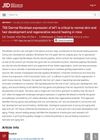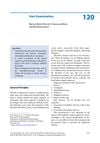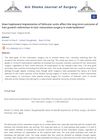 1 citations,
January 2015 in “Journal of clinical and investigative dermatology”
1 citations,
January 2015 in “Journal of clinical and investigative dermatology” IGF-1 from human placenta helps hair grow.
15 citations,
January 2002 in “PubMed” Finasteride effectively treats male pattern hair loss without serious side effects.
15 citations,
January 2012 in “International journal of trichology” The HairCheck® device is effective for measuring hair loss and growth in people with alopecia.
 2 citations,
January 1994 in “Journal of S C C J”
2 citations,
January 1994 in “Journal of S C C J” The study concluded that certain hair growth measurements are good indicators of baldness severity and provide a more accurate assessment than subjective grading.
 4 citations,
January 2015 in “Journal of drug assessment”
4 citations,
January 2015 in “Journal of drug assessment” Finasteride gel effectively and safely reduces hair thickness in women with excessive hair growth.
 16 citations,
April 2015 in “Lasers in Surgery and Medicine”
16 citations,
April 2015 in “Lasers in Surgery and Medicine” Using a fractional laser can stimulate hair growth, but the intensity and duration of inflammation are crucial. Too much can cause ulcers and scarring. Lower beam energy and fewer treatments are recommended to avoid damage.
 July 2022 in “Journal of Investigative Dermatology”
July 2022 in “Journal of Investigative Dermatology” Lef1 is essential for normal skin, hair growth, and healing wounds in mice.
 May 2011 in “Value in Health”
May 2011 in “Value in Health” No current patient-reported outcome measure fully meets FDA requirements for alopecia treatments.
 September 2017 in “Journal of Investigative Dermatology”
September 2017 in “Journal of Investigative Dermatology” Certain products and treatments can improve hair health and growth.
 24 citations,
January 2019 in “Science China Life Sciences”
24 citations,
January 2019 in “Science China Life Sciences” Chitosan/LiCl composite scaffolds help heal deep skin wounds better.
Rosemary oil effectively promotes hair growth in mice.
 2 citations,
July 2023 in “Journal of Cosmetic Dermatology”
2 citations,
July 2023 in “Journal of Cosmetic Dermatology” The topical treatment reduced hair loss and improved hair growth in patients with certain types of hair loss.
 January 2015 in “Springer eBooks”
January 2015 in “Springer eBooks” Understanding hair structure and growth is key for diagnosing hair diseases accurately.
 2 citations,
January 2010
2 citations,
January 2010 Finasteride helps improve hair growth in men with hair loss but may increase the risk of erectile dysfunction.
 October 2018 in “International journal of clinical & experimental dermatology”
October 2018 in “International journal of clinical & experimental dermatology” Baicapil was effective in reducing hair loss and increasing hair growth in women with telogen effluvium.
 24 citations,
September 2020 in “Dermatology and therapy”
24 citations,
September 2020 in “Dermatology and therapy” Oral minoxidil 5 mg daily increases hair growth safely in men with hair loss, with minor side effects.
 18 citations,
March 2003 in “PubMed”
18 citations,
March 2003 in “PubMed” Hair loss in women can be due to abnormal hair growth cycles or damaged hair follicles, with the most common type being androgenetic alopecia; treatment varies by cause, and the psychological impact is significant.
 October 2012 in “Ain-Shams Journal of Surgery”
October 2012 in “Ain-Shams Journal of Surgery” The direction of hair implants doesn't affect the final direction of hair growth in baldness treatments.
July 2022 in “Hair transplant forum international” Finasteride is effective and safe for long-term use in treating hair loss in Japanese men.
1 citations,
December 2020 in “Journal of Cosmetic Dermatology” The cosmetic product effectively reduced hair growth and thickness on forearms.
 March 2024 in “International journal of research in medical sciences”
March 2024 in “International journal of research in medical sciences” Dr. SKS hair booster serum effectively treats hair loss caused by COVID-19.
 26 citations,
May 2017 in “Lasers in Medical Science”
26 citations,
May 2017 in “Lasers in Medical Science” Laser therapy and hair growth factors significantly improve hair density in male baldness.
 20 citations,
September 2016 in “Indian Journal of Dermatology, Venereology and Leprology”
20 citations,
September 2016 in “Indian Journal of Dermatology, Venereology and Leprology” Platelet-rich plasma treatment significantly increased hair diameter and density, stopped hair fall, and boosted hair growth in men with hair loss, with no reported side effects.
 90 citations,
August 2002 in “European journal of endocrinology”
90 citations,
August 2002 in “European journal of endocrinology” Metformin improves hair growth and menstrual frequency in women with PCOS and hirsutism.
 8 citations,
February 2017 in “Archives of Dermatological Research”
8 citations,
February 2017 in “Archives of Dermatological Research” Intense pulsed light treatment effectively reduces underarm hair by making hair follicles smaller and extending their resting phase.
 32 citations,
September 2016 in “Dermatologic Surgery”
32 citations,
September 2016 in “Dermatologic Surgery” The evidence for using Low-Level Laser Therapy for hair loss is limited and more thorough research is needed.
 18 citations,
February 2001 in “Journal of International Medical Research”
18 citations,
February 2001 in “Journal of International Medical Research” Hairgain® significantly increased hair growth and was well-tolerated by individuals with hair loss.
June 2022 in “Research journal of topical and cosmetic sciences” Trichovitals® supplement improves hair thickness, reduces hair loss, and promotes hair growth in young adults.
 December 2024 in “PubMed”
December 2024 in “PubMed” The supplement improved hair density and was safe to use.
 March 2024 in “International Research Journal of Modernization in Engineering Technology and Science”
March 2024 in “International Research Journal of Modernization in Engineering Technology and Science” The herbal shampoo made hair shinier, smoother, and softer without side effects.
























